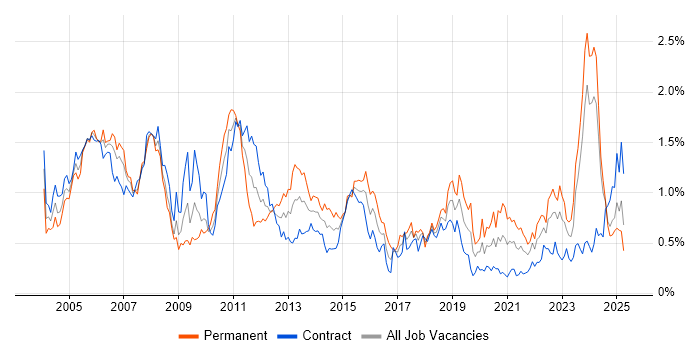Financial Institution
UK > Scotland
The table below looks at the prevalence of the term Financial Institution in permanent job vacancies in Scotland. Included is a benchmarking guide to the salaries offered in vacancies that cited Financial Institution over the 6 months leading up to 14 January 2026, comparing them to the same period in the previous two years.
| 6 months to 14 Jan 2026 |
Same period 2025 | Same period 2024 | |
|---|---|---|---|
| Rank | 114 | 125 | 104 |
| Rank change year-on-year | +11 | -21 | +68 |
| Permanent jobs citing Financial Institution | 27 | 23 | 100 |
| As % of all permanent jobs in Scotland | 0.98% | 0.90% | 3.18% |
| As % of the General category | 1.70% | 1.32% | 4.26% |
| Number of salaries quoted | 6 | 6 | 6 |
| 10th Percentile | £69,375 | £46,000 | £60,000 |
| 25th Percentile | - | £49,500 | £70,938 |
| Median annual salary (50th Percentile) | £85,000 | £54,500 | £77,500 |
| Median % change year-on-year | +55.96% | -29.68% | +31.57% |
| 75th Percentile | - | £58,500 | £123,747 |
| 90th Percentile | - | £59,250 | £137,913 |
| UK median annual salary | £85,000 | £85,000 | £77,500 |
| % change year-on-year | - | +9.68% | +3.33% |
All General Skills
Scotland
Financial Institution falls under the General Skills category. For comparison with the information above, the following table provides summary statistics for all permanent job vacancies requiring general skills in Scotland.
| Permanent vacancies with a requirement for general skills | 1,584 | 1,746 | 2,349 |
| As % of all permanent jobs advertised in Scotland | 57.33% | 68.12% | 74.62% |
| Number of salaries quoted | 655 | 717 | 1,379 |
| 10th Percentile | £25,684 | £31,250 | £25,000 |
| 25th Percentile | £28,625 | £41,250 | £31,250 |
| Median annual salary (50th Percentile) | £35,000 | £55,000 | £52,500 |
| Median % change year-on-year | -36.36% | +4.76% | -11.80% |
| 75th Percentile | £55,000 | £70,000 | £71,250 |
| 90th Percentile | £75,540 | £93,761 | £84,056 |
| UK median annual salary | £52,500 | £60,000 | £58,000 |
| % change year-on-year | -12.50% | +3.45% | -6.07% |
Financial Institution
Job Vacancy Trend in Scotland
Historical trend showing the proportion of permanent IT job postings citing Financial Institution relative to all permanent IT jobs advertised in Scotland.

Financial Institution
Salary Trend in Scotland
Salary distribution trend for jobs in Scotland citing Financial Institution.

Financial Institution
Salary Histogram in Scotland
Salary distribution for jobs citing Financial Institution in Scotland over the 6 months to 14 January 2026.
Financial Institution
Job Locations in Scotland
The table below looks at the demand and provides a guide to the median salaries quoted in IT jobs citing Financial Institution within the Scotland region over the 6 months to 14 January 2026. The 'Rank Change' column provides an indication of the change in demand within each location based on the same 6 month period last year.
| Location | Rank Change on Same Period Last Year |
Matching Permanent IT Job Ads |
Median Salary Past 6 Months |
Median Salary % Change on Same Period Last Year |
Live Jobs |
|---|---|---|---|---|---|
| Edinburgh | -12 | 19 | - | - | 4 |
| Glasgow | +24 | 8 | £85,000 | +88.89% | |
| Financial Institution UK |
|||||
Financial Institution
Co-Occurring Skills & Capabilities in Scotland by Category
The following tables expand on the one above by listing co-occurrences grouped by category. They cover the same employment type, locality and period, with up to 20 co-occurrences shown in each category:
